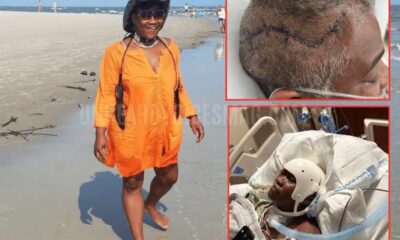Police
Hospital defends care prior to Anna Brown’s death
The story of Anna Brown reaching national attention has prompted hospital officials to come forward with a statement defending actions workers took before Brown was arrested for trespassing there.
The story of Anna Brown reaching national attention has prompted hospital officials to come forward with a statement defending actions workers took before Brown was arrested for trespassing there.
“The staff at St. Mary’s has heard the outrage being expressed about this tragic event,” Kate Becker, president of SSM St. Mary’s Health Center, said in a videotaped statement posted on the hospital’s website Thursday.
Becker said the hospital had received calls from the public since the story ran.
“We followed established medical guidelines and performed appropriate tests. Unfortunately, even with appropriate testing using sophisticated technology, blood clots can still be undetected in a small number of cases,” the statement continued.
Anna Brown had been to three hospitals within the week complaining of leg pains.
Police escorted her out the St. Louis Hospital because she refused to leave, saying she was in too much pain to stand.
She was carried to a squad car and driven to the Richmond Heights Police Department where officers carried her into a cell and laid her on the floor. She was found dead fifteen minutes later.
Anna Brown’s Death
An autopsy of Anna Brown concluded blood clots had spread from her legs to her lungs eventually killing her.
Originally visiting the hospital because of a sprained ankle, Brown was unaware the sprained ankle caused blood clots in her leg.
A doctor at St. Mary’s told police that she was okay to be released. At 7:33 in the video below, you can hear an officer in the cell after she died say, “we thought she was drug sick” but the autopsy revealed that she had not taken any drugs.
The Centers for Medicare and Medicaid Services’ investigation found St. Mary’s was in compliance with federal emergency care laws that require hospitals to treat patients regardless of their ability to pay.
The investigation found that medical staff conducted an ultrasound of Brown’s legs about 24 hours before she died, which did not reveal any clots. One nurse claimed she saw Brown put on her pants and stand.
— stltoday
After losing her home because of a tornado in 2010, Anna Brown had been on a downward spiral. The 29-year-old mother moved to a St. Louis suburb with her family following the tragedy but lost her job shortly after.
After losing her job, Brown couldn’t pay her bills, her utilities were cut off, and when an agent from child welfare visited her home the toilet was found with feces and burn marks on the floor where she lit fires to keep warm.
Anna Brown was arrested for parent neglect and her mother, Dorothy Davis, received custody of her children with the condition Brown couldn’t live with them. Because her home was condemned, Brown had lived in four homeless shelters from May to September. She also joined the St. Louis Empowerment Center, a drop-in center for people who are mentally ill.
Family, friends, and activists are calling for justice of Anna Brown demanding answers into the woman’s death. The family believes Anna Brown was treated unfairly and has hired a lawyer to prove it.
Was the decision to remove her from the ER the right to do?
Real stories. Real impact. Straight to your inbox. Join thousands others. Click here to subscribe to our newsletter today!
Discover more from Unheard Voices Magazine®
Subscribe to get the latest posts sent to your email.
-

 Black Excellence2 weeks ago
Black Excellence2 weeks agoShirley Raines, Beauty 2 The Streetz founder who helped Skid Row’s homeless, dies at 58
-

 Crime & Justice2 weeks ago
Crime & Justice2 weeks agoNew Brunswick, NJ 16-year-old shot and killed inside home
-

 Community2 weeks ago
Community2 weeks agoGeorgia woman partially paralyzed after sword attack, family launches GoFundMe
-

 Culture2 weeks ago
Culture2 weeks agoSt. Thomas Carnival 2026 dates announced
-

 Opinions1 week ago
Opinions1 week agoThe arrests of journalists who covered Minnesota church protest is an attack on independent journalism and freedom of press
-

 Crime & Justice2 weeks ago
Crime & Justice2 weeks agoLegal Defense Fund calls on federal leaders to condemn violence against public officials and cease inciteful rhetoric
-

 Crime & Justice2 weeks ago
Crime & Justice2 weeks agoFormer Illinois sheriff’s deputy sentenced to maximum 20 years for murder of Sonya Massey
-

 Social Justice1 week ago
Social Justice1 week agoTemple student who assisted Don Lemon in covering Minnesota protest faces federal charges


























